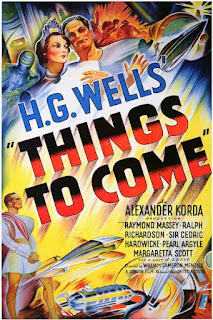
Director:
William Cameron Menzies
Year: 1936
Rating: 8.0
Year: 1936
Rating: 8.0
This is a remarkable film on many levels. Inventive, imaginative and full
of big ideas. But though you might respect it, you are unlikely to love it
because it is impersonal, didactic and as much a manifesto as a story. The
first 30-minutes will take your breath away but then it becomes politically
very heavy-handed and crawls along. But even then the sets, the designs,
the special effects, the miniatures, the crowd scenes are wonderful. My rating
isn't for the narrative but simply for how it looks and how ambitious the
film is.
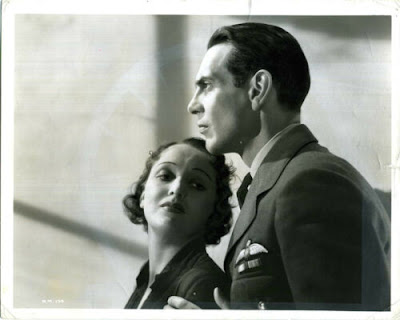
It is based on a book from H.G. Wells that he wrote in 1933 and the film came out three years later. In the book, Wells predicts the next 100 years of mankind's history and covers war, pestilence, fascism, economic collapse and then a benign authoritarian utopia built out of the ashes through science and intellect. In the end of the film the leader of this world gives a near fanatic monologue as a spaceship is headed towards the moon that this is just the beginning. We will conquer this universe and then beyond. It is 100 minutes long - cut from the original of 140 minutes. I wonder if Well's vision of religion in his book was edited out. In the book, the Utopia destroys all religion as superstition and a hinderance to progress - invades Mecca, puts the Pope to sleep. That would probably still not go over well today.
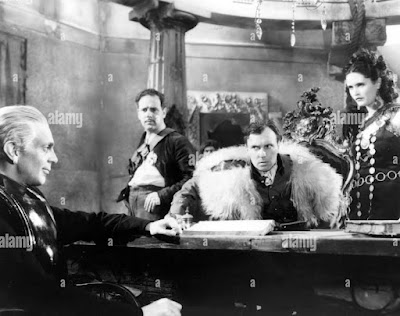
It is directed by William Cameron Menzies who is better known for being a set designer than a director - though he did direct a film that literally gave me nightmares as a child - Invaders from Mars. And that is reflected in the film - it looks spectacular especially for its time but the human element, human emotions and their interactions is almost missing. But he gives us a few astonishing scenes. Again, the book was written in 1933 and the film in 1936. The film begins on Christmas 1940. In a city called Every Town that is clearly London, children are smiling, people are bustling in the streets, others getting together to celebrate but in the midst of all this are newspaper headlines screaming "Europe on the Edge of War". John Cabal (Raymond Massey) is with his wife and son and a few guests and he says war is coming. His friend says no chance. We are all fat with prosperity - who goes to war when that is true.
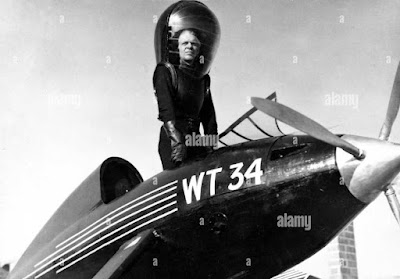
A few minutes later the air sirens are heard, then artillery - and the film shifts to a town square where bombs are falling, people are panicked and racing for the undergrounds for safety, troops and artillery are being set up to bring down the planes, buildings are toppling on top of people. It is an incredibly powerful and well edited scene especially when you know that in 1940 this will in fact be true. In the book Wells outlines how the war will go, what nations will join with what nations - much of that turned out to be wrong - America and Japan become allies. The film skips all that detail - just focuses on the war, the marching troops, the bombs, the poison gas, the weariness as it drags on decade after decade. After the war the pestilence comes - the Wandering Sickness - that turns people into near zombies and kills half the world's population. Tinpot Mussolini like Warlords set themselves up and begin to war again. Ralph Richardson plays one of these and this is where the film really dodders for a while.
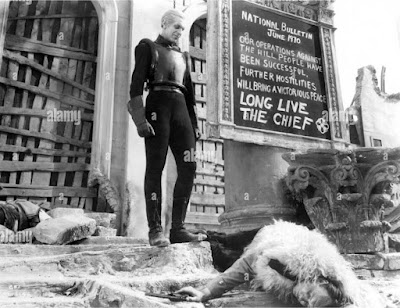
Finally Cabal returns - gray haired now - but in a very stylish plane - he tells Richardson that a new world is being created - his is over - and the planes come and civilization begins anew. The film creates an imaginative world with miniatures - grand buildings, mono rails, outside elevators, huge wide streets, industry at work and a giant spaceship to the Moon. Wells had of course written his book of going to the moon many years previously - First Men in the Moon - but his technology here is much closer to Verne's vision in From the Earth to the Moon. A giant gun. For its time it just feels like a big film that wanted to make an impact. I doubt if it did but Wells was a visionary - he predicted the League of Nations, the UN, the coming war and of course invisible men.
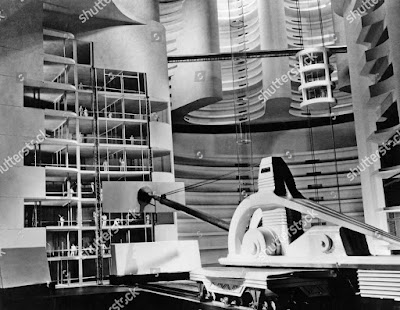

It is based on a book from H.G. Wells that he wrote in 1933 and the film came out three years later. In the book, Wells predicts the next 100 years of mankind's history and covers war, pestilence, fascism, economic collapse and then a benign authoritarian utopia built out of the ashes through science and intellect. In the end of the film the leader of this world gives a near fanatic monologue as a spaceship is headed towards the moon that this is just the beginning. We will conquer this universe and then beyond. It is 100 minutes long - cut from the original of 140 minutes. I wonder if Well's vision of religion in his book was edited out. In the book, the Utopia destroys all religion as superstition and a hinderance to progress - invades Mecca, puts the Pope to sleep. That would probably still not go over well today.

It is directed by William Cameron Menzies who is better known for being a set designer than a director - though he did direct a film that literally gave me nightmares as a child - Invaders from Mars. And that is reflected in the film - it looks spectacular especially for its time but the human element, human emotions and their interactions is almost missing. But he gives us a few astonishing scenes. Again, the book was written in 1933 and the film in 1936. The film begins on Christmas 1940. In a city called Every Town that is clearly London, children are smiling, people are bustling in the streets, others getting together to celebrate but in the midst of all this are newspaper headlines screaming "Europe on the Edge of War". John Cabal (Raymond Massey) is with his wife and son and a few guests and he says war is coming. His friend says no chance. We are all fat with prosperity - who goes to war when that is true.

A few minutes later the air sirens are heard, then artillery - and the film shifts to a town square where bombs are falling, people are panicked and racing for the undergrounds for safety, troops and artillery are being set up to bring down the planes, buildings are toppling on top of people. It is an incredibly powerful and well edited scene especially when you know that in 1940 this will in fact be true. In the book Wells outlines how the war will go, what nations will join with what nations - much of that turned out to be wrong - America and Japan become allies. The film skips all that detail - just focuses on the war, the marching troops, the bombs, the poison gas, the weariness as it drags on decade after decade. After the war the pestilence comes - the Wandering Sickness - that turns people into near zombies and kills half the world's population. Tinpot Mussolini like Warlords set themselves up and begin to war again. Ralph Richardson plays one of these and this is where the film really dodders for a while.

Finally Cabal returns - gray haired now - but in a very stylish plane - he tells Richardson that a new world is being created - his is over - and the planes come and civilization begins anew. The film creates an imaginative world with miniatures - grand buildings, mono rails, outside elevators, huge wide streets, industry at work and a giant spaceship to the Moon. Wells had of course written his book of going to the moon many years previously - First Men in the Moon - but his technology here is much closer to Verne's vision in From the Earth to the Moon. A giant gun. For its time it just feels like a big film that wanted to make an impact. I doubt if it did but Wells was a visionary - he predicted the League of Nations, the UN, the coming war and of course invisible men.
